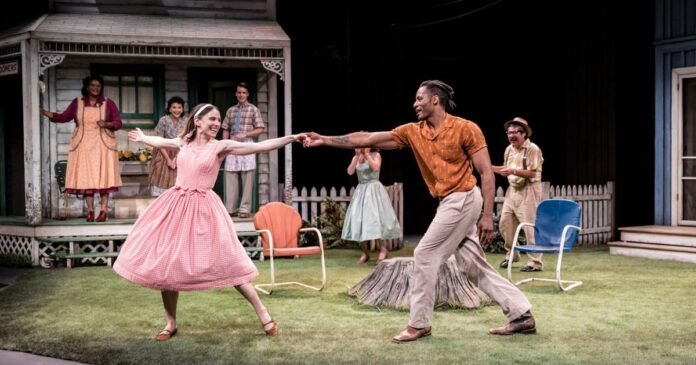The phrase “pretty privilege” would sound foreign to the people of “Picnic,” set in a small Kansas town in the 1950s.
But Madge would know what it means. She’d understand that she has it, and she’d hate it.

Alina Taber plays Madge, “a beautiful girl,” in American Players Theatre’s “Picnic.”
“Maybe I get tired being looked at,” Madge tells her mother. And later: “Lots of the time I wonder if I really exist.”
“Picnic,” William Inge’s Pulitzer Prize-winning 1953 play, is so much about looking, about shiny surfaces and darker depths. Maybe it’s odd to think of a story set in a place where everybody knows everybody else’s business as being so much about performance, but so it is.
American Players Theatre, which produces “Picnic” through Sept. 13, turns the Hill stage into a shared backyard. Takeshi Kata’s design brings midcentury shades of “All My Sons” and Tennessee Williams, with peeling porch paint and every bush in bloom.
It’s Labor Day in Kansas, sticky and stagnant, when Hal Carter (Rasell Holt, smoldering) comes to town. Helen Potts (Dee Dee Batteast, fanning herself for many reasons) gives him pie for breakfast, throws some odd jobs his way and takes his shirt. For, ahem, cleaning.
Mrs. Potts shares her backyard with a house full of women: mother Flo (Tracy Michelle Arnold) and her daughters, 18-year-old daughter Madge (Alina Taber) and 16-year-old daughter Millie (Kelly Simmons). Unmarried schoolteacher Rosemary (Colleen Madden) rents one of Flo’s upstairs rooms.

Rasell Holt, left, plays Hal and Dee Dee Batteast plays Helen Potts in American Players Theatre’s “Picnic.”
Hal’s sixpack must have a magnet embedded in it, the way the heads of these women swivel toward Holt’s muscled torso. Only Madge can’t look directly at him, like his biceps would burn her retinas. Her milquetoast boyfriend Alan (Colin Covert) doesn’t stand a chance.
Alan and Hal know each other from their frat in college, where Hal was on a football scholarship. Hal, having skidded into a rougher patch, wants Alan to help him find a job.
Though the 1953 Broadway casting appears to have been monochrome, director Brenda DeVita complicates Inge’s class tension with another layer — Hal is Black.
When Flo asks after the fraternity connection (“don’t those boys have a little more … breeding?”) or Alan shoots down the idea of country club membership (“oh, he won’t be able to afford that”) it sounds like a familiar strain of racism underneath “Midwest nice.”
Inge surrounds lovely, unhappy Madge and tomboy Millie with examples of frustrated love. And though “Picnic” has a playful side — Brian Cowing’s 1950s style choreography is infectiously fun — DeVita takes their struggles seriously, however mundane.

Flo (Tracy Michelle Arnold), Millie (Kelly Simmons) and Madge (Alina Taber) prepare for a party in “Picnic” at American Players Theatre.
An assignation between a lonely schoolteacher (Madden) and a timid shopkeeper (Triney Sandoval) plays out, late at night, like a Greek tragedy. Millie’s teenage jealousy at being “the smart one” feels real, relatable to anyone with a sibling. The invisibility of middle aged women, the complicated currency of beauty — it resonates, still.
In the middle of all of this, Holt embodies Hal with a mix of bravado and unease. He clings to Madge like a life raft, their connection throwing sparks within the stifling confines of their lives. Hal can’t promise happiness, just change.

Takeshi Kata designed the set for “Picnic” by William Inge at American Players Theatre.
Amid the birdsong and breezes on the hill, APT’s “Picnic” feels lively and lived-in. Costume designer Holly Payne puts the women in fit-and-flare dresses and gingham, strappy espadrilles and helmet-sturdy wigs. Dawn Chiang’s lighting design subtly shows the passage of time, as fizzing porchlights make way for thin, early morning sun.
The characters in “Picnic” may not see more clearly at the end of this one fateful Labor Day. But they see differently. Sometimes that’s enough.
Lindsay Christians is an editor for the Cap Times. Lindsay oversees the newsroom’s coverage of food, arts and culture in the Madison region. Email story ideas and tips to Lindsay at lchristians@captimes.com.
Please consider supporting Lindsay’s work by becoming a Cap Times member or sponsor. Sustaining local journalism in Madison depends on readers like you.






